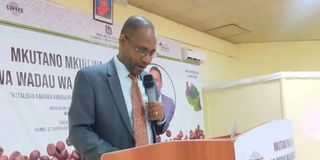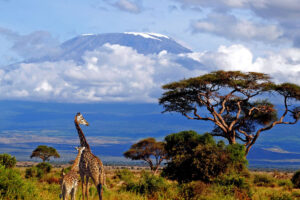Moshi. The Tanzania Coffee Board (TCB) has embarked on an initiative that seeks to protect its access to the European Union (EU) coffee market by launching a comprehensive registration of all coffee farmers across the country.
The initiative comes in response to new EU regulations requiring that coffee imported into Europe must be produced without contributing to environmental degradation.
The new law, introduced by the EU, mandates that coffee imports must not contribute to environmental degradation, a requirement that Tanzania, a major coffee exporter, must meet.
The EU Regulations on Deforestation-Free Products (EUDR) that entered into force on June 29, 2023, require coffee placed or made available on the EU market or exported from it as of Dec 30, 2024 to be produced on land that was not deforested after Dec 31, 2020, and in accordance with relevant national local legislations.
For this purpose, each coffee producing country needs to submit a Due Diligence statement and corresponding geolocation data for all plots of land where coffee was produced.
Several countries have expressed concern that they have both financial and technical challenges to roll out the traceability system of coffee in compliance with the EUDR.
Importers of coffee have threatened to halt existing contracts and not enter new ones for non-compliance, which can have negative consequences to farmers.
Speaking in Moshi on Saturday September 7, 2024, TCB director general, Mr Primus Kimaryo, said the registration process would commence in September and run through to January 2025.
According to him, the registration seeks to ensure that all coffee farms are officially recognised and that their operations are environmentally sustainable.
“We will start the registration in Kagera, which produces over 40 percent of Tanzania’s coffee, and then extend it to the other 16 coffee-producing regions. Every farmer will be registered by providing their identification, having their photo taken, and documenting their farm and its coffee production history,” Mr Kimaryo told reporters.
The European Union accounts for about 50 percent of Tanzania’s coffee exports, making compliance with the new environmental regulation crucial for maintaining the market.
“To continue accessing the EU market, we must ensure our coffee is not linked to environmental degradation,” Mr Kimaryo emphasised.
Tanzania Coffee Board (TCB) Director General Mr. Primus Kimaryo speaking to reporters on Saturday, September 7, 2024, in Moshi. PHOTO | JANETH JOSEPH
Beyond coffee, the EU’s new regulations also apply to other commodities like timber, rubber, palm oil, and cocoa.
Mr Kimaryo stressed that all coffee farmers must be registered as part of efforts to demonstrate that Tanzania’s coffee production does not contribute to deforestation or environmental damage.
To fast-track the registration process, Mr Kimaryo called for cooperation from local councils in coffee-growing regions, urging them to assist in ensuring that all farmers are documented before the January 2025 deadline.
He said this was necessary to meet EU certification requirements for products imported from Tanzania.
“We have limited time to ensure all farmers are registered and that we have sufficient documentation to prove that our coffee and other agricultural produces are produced in an environmentally responsible manner. I urge farmers to cooperate fully so we can complete this crucial task and continue accessing the EU market,” Mr Kimaryo said.
He also said that the Ministry of Agriculture is in ongoing discussions with the EU on other relevant issues, including the use of pesticides, seed availability, and farming practices.
Mr Kimaryo highlighted that the registration process will involve collaboration between the government and other stakeholders, including agricultural officers, cooperative officers, and university students. He affirmed that the government is committed to using its systems to ensure the registration is done efficiently and in time.
The TCB’s registration initiative comes at a critical time, as global markets increasingly demand sustainability and accountability in agricultural production.
The success of this process will not only safeguard Tanzania’s access to the EU market but also contribute to a greener, more sustainable coffee industry.















